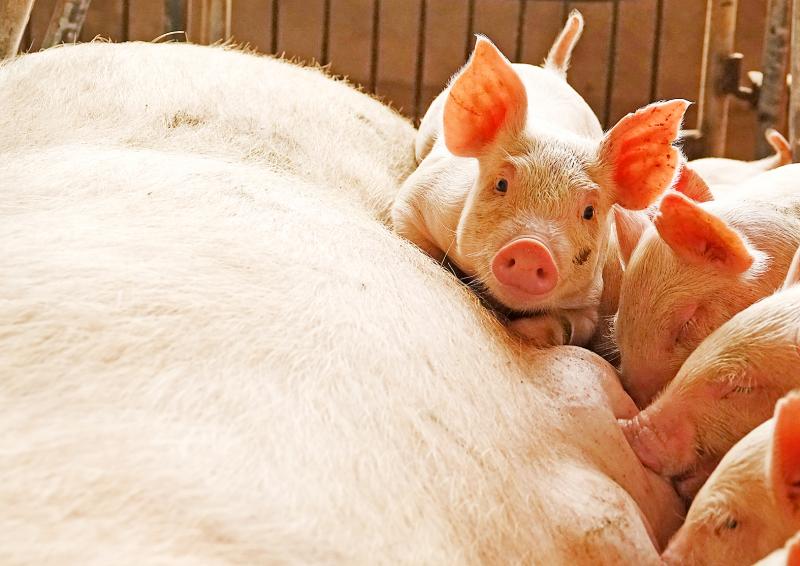Travelers from Nepal are no longer permitted to bring pork or pork products into Taiwan, after the Southeast Asian nation on Wednesday reported its first case of African swine fever to the World Organisation for Animal Health, Council of Agriculture Minister Chen Chi-chung (陳吉仲) said yesterday.
Contravening the ban, which was to start yesterday, would result in a NT$200,000 (US$6,718) fine for first-time offenders and a NT$1 million fine for repeat offenders, Chen said, adding that arrivals who are unable to pay the fines would be refused entry.
As the council tightens controls ahead of the Dragon Boat Festival next month, it said that repeat offenders or willful recipients of pork products shipped from areas affected by African swine fever are to face fines of at least NT$200,000.

Photo: Reuters
Previously, recipients of banned pork products would be questioned by the council and required to report the shipment or risk a fine.
In anticipation of an expected rise in inbound shipments of pork products ahead of the festival on June 3, the Bureau of Animal and Plant Health Inspection and Quarantine is imposing stricter penalties on repeat offenders, starting from today.
Those caught receiving packages containing banned pork products multiple times would be subject to a fine of NT$200,000 to NT$1 million, as per Article 43 of the Statute for Prevention and Control of Infectious Animal Diseases (動物傳染病防治條例), the bureau said.
The changes are intended to encourage recipients to contact senders to tell them to refrain from shipping similar products to Taiwan, it said.
Those found to have knowingly imported illegal products after an interview with the council would also be fined, even if they are a first-time offender, it added.
Inspections have been heightened and farmers banned from feeding hogs food waste after August last year, when travelers from affected countries brought contaminated pork to Taiwan.
African swine fever poses a major threat to the pork industry, which accounts for more than 90 percent of domestic pork consumption and is worth about NT$7.2 billion, council data showed.
All products containing pork from countries affected by African swine fever are banned, including processed foods, pet food and animal feed.
UN Food and Agriculture Organization data showed that the following Asian countries have detected the disease since 2018: Bhutan, Cambodia, China (including Hong Kong), East Timor, India, Indonesia, Laos, Malaysia, Mongolia, Myanmar, Nepal, North Korea, Papua New Guinea, the Philippines, South Korea, Thailand and Vietnam.
From September last year to last month, customs officials had intercepted 569 packages containing illegal pork products totaling 542.57kg, the bureau said.
Most were from China and Hong Kong, followed by Thailand, Vietnam and the Philippines.

Taiwanese can file complaints with the Tourism Administration to report travel agencies if their activities caused termination of a person’s citizenship, Mainland Affairs Council Minister Chiu Chui-cheng (邱垂正) said yesterday, after a podcaster highlighted a case in which a person’s citizenship was canceled for receiving a single-use Chinese passport to enter Russia. The council is aware of incidents in which people who signed up through Chinese travel agencies for tours of Russia were told they could obtain Russian visas and fast-track border clearance, Chiu told reporters on the sidelines of an event in Taipei. However, the travel agencies actually applied

Japanese footwear brand Onitsuka Tiger today issued a public apology and said it has suspended an employee amid allegations that the staff member discriminated against a Vietnamese customer at its Taipei 101 store. Posting on the social media platform Threads yesterday, a user said that an employee at the store said that “those shoes are very expensive” when her friend, who is a migrant worker from Vietnam, asked for assistance. The employee then ignored her until she asked again, to which she replied: "We don't have a size 37." The post had amassed nearly 26,000 likes and 916 comments as of this

New measures aimed at making Taiwan more attractive to foreign professionals came into effect this month, the National Development Council said yesterday. Among the changes, international students at Taiwanese universities would be able to work in Taiwan without a work permit in the two years after they graduate, explainer materials provided by the council said. In addition, foreign nationals who graduated from one of the world’s top 200 universities within the past five years can also apply for a two-year open work permit. Previously, those graduates would have needed to apply for a work permit using point-based criteria or have a Taiwanese company

The Shilin District Prosecutors’ Office yesterday indicted two Taiwanese and issued a wanted notice for Pete Liu (劉作虎), founder of Shenzhen-based smartphone manufacturer OnePlus Technology Co (萬普拉斯科技), for allegedly contravening the Act Governing Relations Between the People of the Taiwan Area and the Mainland Area (臺灣地區與大陸地區人民關係條例) by poaching 70 engineers in Taiwan. Liu allegedly traveled to Taiwan at the end of 2014 and met with a Taiwanese man surnamed Lin (林) to discuss establishing a mobile software research and development (R&D) team in Taiwan, prosecutors said. Without approval from the government, Lin, following Liu’s instructions, recruited more than 70 software